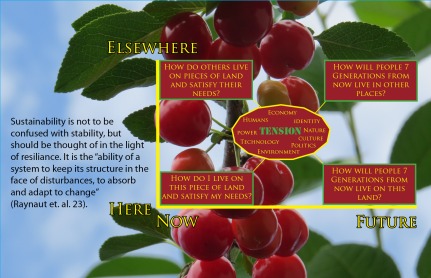I’ve sat to write this post a number of times and always feel like I don’t know enough to tackle the discussion. In my course on Environment, Traditional Cultures and Sustainability, we were asked: What is sustainability? Course readings pushed us to ask how we consider sustainability in the way that we relate with not only the natural world, but the people and cultures that populate the planet.
Take, for instance, the reading by Raynaut et. al. in Sustainability and Communities of Place. The essay looks first at the varying definitions of sustainable development, of which there were “no fewer than sixty different definitions” (Raynaut et. al. 21) in 1995, and outlines a very useful way to consider the varying realms of sustainability.
Here’s a picture of the continuum they construct in the reading.
In my process of considering sustainability, I came across the final discussion panel of the 2008 Slow Food Nation gathering. Of particular interest was Wendell Berry’s discussion on Scaling Down our Carbon Footprint (at 13:24).
“For too long humans have been spared, mainly by the cheapness of the fossil fuels, from the universal necessity of local adaptation. It is ultimately an inescapable biological imperative that human land-use economies should correspond as closely as possible to the ecological mosaic. To this we no longer have even the illusion of a second choice.”
Berry speaks to the center point, to the tension between the 4 points of Raynaut et. al.’s analytical tool. It is only because of the systems we have built, systems grounded on exploitation of the elsewhere and future, that we have been able to collapse the entire continuum into the satisfaction of the here and now. In Berry’s argument, it will only be through the return to the necessity of local adaptation that we will again come into a dialectical relationship. A dialectical relationship recognizes, as Leslie Main Johnson stated in her text, Traveler’s Story, Traveler’s Path, that the “landscape has agency” (Main Johnson 204). Cultivating that relationship in the here and now – remembering that in dialectics, reality is constantly emerging – leaves space for proper use of human cultural and physical technologies in SERVICE rather than TENSION with future and elsewhere considerations.
Of course, ethical considerations for the privileging of one agent over another will largely define what service looks like. And I look to Aldo Leopold and Spirit of the Land to encourage those conversations.
A land ethic, then, reflects the existence of an ecological conscience, and this in turn reflects a conviction of individual responsibility for the health of the land. Health is the capacity of the land for self-renewal. Conservation is our effort to understand and preserve this capacity.
